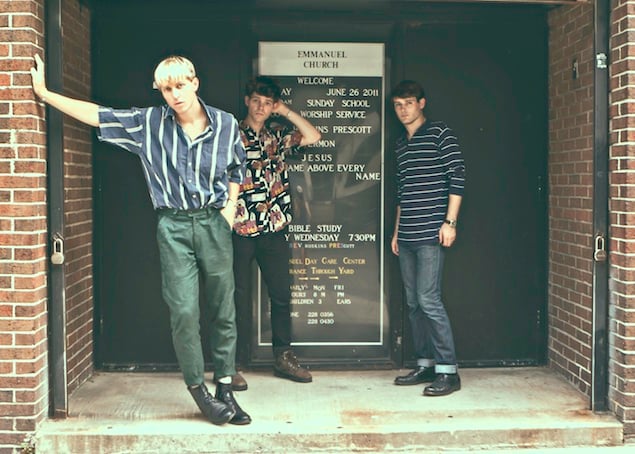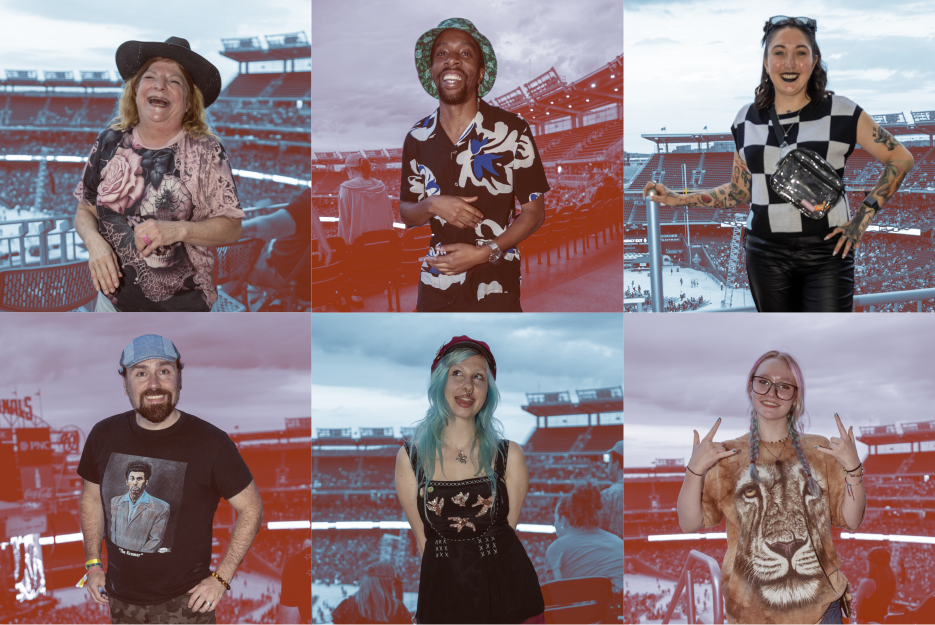The Drums were born at summer camp: That’s where founding members Jonathan Pierce and Jacob Graham first met and bonded over their love of synthesizers and ’80s pop. More than a decade later, they’ve gained worldwide acclaim for reviving the nostalgic sounds they loved as kids. Their self-titled debut received praise from media outlets such as Pitchfork, NME, and the BBC, who included the Drums in the top five of the BBC’s Sound of 2010 list.
This weekend the Brooklyn-based five-piece start a new US tour, which will feature tracks from their sophomoric effort Portamento. The synth-heavy record recalls the vintage charm of their first release, while also presenting complex lyrical content that explores everything from atheism to heartbreak. Ditties like “Book of Revelation” and “I Don’t Know How to Love” are well written and manage not to break the band’s bouncy, spirited flow. Tracks filled with soothing reverbs, such as “Money” and “Days,” bring a whimsical sense to the album.
But the lifespan of the Drums hasn’t been as smooth and dreamy as their songs. Hiccups along the way have included the loss of two band members and mentions of breaking up. We chatted with founding member and synth player Jacob Graham–who, while preparing for a show at the Black Cat this Saturday, candidly revealed both his struggles in the band and what he’s looking forward to in their future.
You’re in a band with lead singer Jonny Pierce, whom you’ve know since you were a kid. Can you tell me about what that dynamic is like?
Well, for me it’s easier to work with Jon than it is with anyone else, just because we kind of grew up together. We met each other because of music, because we liked the same stuff. So because we’ve always played music for each other, our whole relationship is based around it. I feel like if I was working with someone else, we’d spend a lot of time explaining things to one another. But when Jon and I work together, we can very quickly move from one thing to the next because we’re so on the same page about things. We’re really honest about what we’re trying to do.
Did you think you guys would be in a band when you were younger?
The first day we ever met, we said, “We should start a band together.” But at the time, we were living states away from each other, so it always seemed impossible. We always thought, Oh, when we grew up, we’ll have a band together. But who’s to say what age you’re actually grown up? So around the time I was 25, I said, “Let’s finally start this band we’ve been talking about for ten years.” So we moved in together and started working on music. It always seemed like a pipe dream, but once it finally happened, it seemed like the right thing to do.
You’re quoted as saying the band is “kind of fragile and probably on the verge of breaking up pretty constantly.” Do you still think that?
It’s hard to say. It’s an interesting thing, the whole idea of devoting your whole life to this sort of thing. There are so many different aspects. It’s not just having a nice time and making music–there’s so much traveling involved. And I don’t really like traveling; I never have. And I don’t like meeting people particularly. If I had my way I would just live in the middle of nowhere and never leave my house.
Would you call yourself shy?
I think I used to be, but I got forced out of it when this band took off. But naturally, yeah. I want to make music as a living, but the whole dynamic of being in a touring band is not my ideal sort of way to spend my life. I think the whole thing will always be up in the air, because we’re not one of those bands that just loves to be the road, and unfortunately, that’s the way bands make money these days. So it’s this whole internal struggle, but that’s how that goes.
After your debut, you guys blew up very quickly. What do you remember most vividly about making the first album and the reaction you got afterwards?
The two things feel disconnected, because making the record was just Jonathan and me in a dumpy little apartment with no one paying any attention to us. It was kind of a thing for fun after work. We tried to do a good job of it, but we had no idea we were going to get the sort of reaction we did. But we thought after it happened that we liked doing it that way: The idea to be concerned people are going to hear something, to be conscious of that during the creative process, seems like it would hinder things. When we record these days, we try to please our own ears and emulate that sort of process. And it’s increasingly difficult to do that, because you’re so aware other people are going to hear it.
So when you were making the second record, was it easy not to think about other people hearing the album?
In a way, it was easy. I don’t know how to say it exactly, but just because the first album had the reaction it did, and we went from nothing to touring the world multiple times over, we kind of felt invincible. It was kind of this “us against the world” mentality. So going in to make the second record, we definitely thought, “Let’s just be as selfish as ever.” I think the process of recording the third record is going to be the tough one for us, because we’re still touring a lot, but our whole lives–we can see them clearer now. Everything’s not just rushing by, because we understand the way things work now.
On that album, who’s in the picture on the cover? Is that one of you guys or is it a random photograph?
[Laughs.] The child is Jonathan, and the old woman is me.
You’re known for having a vintage sound and being inspired by bands from the past. Are there any comparisons you don’t like getting?
Well, you’re always going to get compared to things you don’t necessarily want to be compared to. And it was hard at first to realize it’s not going to stop–people are going to hear things in your music that remind them of other music, whether you’re a fan of that music or not. The main thing that always bothered me were comparisons to the Beach Boys, because none of us have ever really been fans of them, and at times I’ve kind of disliked them. So it was strange for us to hear that as often as we did, and we thought people weren’t quite understanding what we’re trying to do. But you can’t really change people’s perception of things, especially if you don’t want to change your own sound. So if people think we sound like the Beach Boys, I guess that’s just the way it is.
What are some bands that do inspire you?
When we made our first album, the only bands we were deliberately inspired by were the Shangri-Las, who are an American girl group from the ’60s, and the Wake, who were a post-punk band from Scotland from the early ’80s. We thought they were both kind of perfect, and we wanted to mesh those sounds together. And I feel like in a way, we did. So when we made the second record, we wanted to be really consistent with that sound we established with the first record. But when we made the second record, we were listening to a lot of things that were I guess a lot more technically experimental–things like Wendy Carlos and a lot of those early synthesizer pioneers, like Jean Michel Jarre and Tomita. I don’t know if those influences really show through on the second record so much as maybe it’s just sort of an extra vibe or a slight stylistic sensibility.
You recently toured in Europe. Can you tell me what that was like? Is there a show that sticks out for being particularly energetic or fun?
You know, there actually isn’t. At this point, it’s all cities and shows that start to blur together for me. I think Jonny could probably tell you certain shows that had a great vibe or really energetic crowds, but these days I’m back with my little world of synthesizers and I’m absorbed in that the whole show, so I couldn’t really say. It all runs together for me. But I will say, these past two tours–we did one in Australia before Europe–were nice for everyone. Just the whole energy of the tours felt very nice. As I said, I kind of hate touring, but maybe I’m starting to get resolved to my fate. They’re starting to seem a lot less stressful than they used.
Do you still get nervous before playing a show?
I don’t feel nervous at all anymore. When the band first started, I used to be painfully nervous before shows. I really stressed myself out and it would affect my whole day, dreading that moment. But in the past few years, we’ve probably played 200 concerts, so it naturally goes away, and I’m very glad of that.
What are you looking forward to about this upcoming tour?
I’m looking forward to the bands that are opening up for us. We have two bands we really like–one’s called Craft Spells, who are with the Capture Tracks label, and another one is called Part Time, with Mexico Summer label. We usually only tour with one opening band, and we always try to tour with bands we really like. This is the first time we’ve gone on tour with two opening bands we’re really excited about. I’m excited to watch them every night. And we’re really excited about DC–we’ve always had a great time there.
The Drums play the Black Cat this Saturday, April 21, with Part Time and Dot Dash. Tickets ($15) are available through the Black Cat’s website.
















